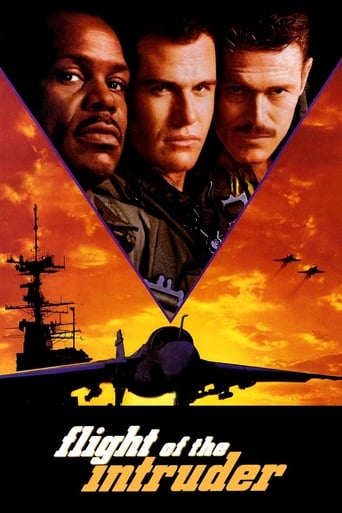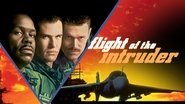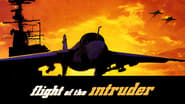Gatorman9
One thing practically nobody posting on this movie is getting is the basis for the plot. Most reviewers are content to just mention that it was based on a novel and let it go at that. What I am not seeing is anybody explaining what the basis for the story was in the first place. One particularly unfortunate reviewer actually goes so far as to get it completely backward and blame the decision-making of "the American military" for the situation that leads to the pilots' frustration that in turn leads to the main line of action.My own father was an American naval aviator during the Vietnam War and when I saw this movie it was like it had been written just for him. The entire time I was growing up (at least until Vietnam was finally over) I heard over and over again at home how our pilots were sent out to risk their lives to bomb what my father called "paths in the jungle" in preference to serious targets like downtown Hanoi. If I had a dollar for every time I heard that I would never have had to work a day in my life. Over and over again he and his naval aviator buddies would go on about how we won World War II because we bombed real targets like enemy cities but how in Vietnam the aviators were limited by the political leadership in Washington to unprofitable secondary targets in the jungle instead. As my father used to put it, "if you bomb a clearing in the jungle what do you get? A bigger clearing in the jungle!" This was part of a broader skein where American military officers of all branches were complaining that Washington was making them fight the war "with one hand tied behind us!" Later, when I was in high school, it was taught that the bombing targets were actually selected personally by the president, Lyndon Baines Johnson, his secretary of defense, Robert McNamara, and other civilian national security office-holders over lunch at the White House. It is no wonder that as a little kid I could not be blamed if I had thought Johnson's full name was "That A**hole Johnson" and McNamara's "That A**hole McNamara". Unless I watched Huntley-Brinkley (i.e., the NBC Nightly News), I rarely seemed to hear their names mentioned any other way at home.But the policy was in fact adopted for reasons of grand strategy which ultimately hearkened back to the Korean War more than a decade earlier. Specifically, there was a serious concern that if we did attempt a "full-scale invasion" of North Vietnam or even a serious bombing campaign there that the Chinese or Russia might intervene directly with their own uniformed forces, because that had actually happened very unnervingly in Korea, thereby raising the specter of Vietnam "escalating" into World War III. Eventually the idea of increased meaningful bombing in the North also became a lightning rod for the anti-war "pacifist" protester crowd as well, only amplifying their vociferous (actually, loud, obnoxious, and even violent) complaints with increasing purely domestic political effects. Thus, without either an invasion of the North by ground troops or a traditional strategic bombing campaign of the sort that was carried out in World War II, the war dragged on for years interminably with no profit to the effort in sight except for the undertakers.In this story the novel's author Stephen Coonts was well-aware of all this and wrote a kind of fantasy that addressed it, conceiving of rogue pilots (which, sorry for you video-gamers and other fantasy-oriented types, do not really exist in real life) who for once do the "right thing" in spite of dire personal consequences take the war "downtown" without orders and in contravention of American national policy. It was the war every naval aviator and so many others throughout the American armed forces really wanted to see, but was rarely engaged in at any point during the conflict. Yet even so, Coonts limits the target to an artillery park, i.e., a purely military target with no North Vietnamese purely civilian casualty exposure contemplated.I hope this makes the context for this movie clearer to everybody. I will add that while the execution of the story isn't the best possible (I agree that the acting was often too clichéd or histrionic and that Danny Glover came off as a caricature of a clichéd drill instructor than a realistic angry Carrier Air Group commander; even his Steelcase desk was too modern for Vietnam), it is better than the 5.7 average rating prevailing at the time of my post, and I accordingly gave it a 7. It is, after all, only a movie, but one that if properly understood, sheds some light on the history of an era and a conflict that so fortunately is mostly behind us.
chad-mchugh
I found the movie interesting. It is probably loosely based on the exploits of Lyle Bull and Charles Hunter who on 30 October 1967 flew a solo flight over Hanoi and received the Navy Cross. Here is part of the citation for Bull: Lieutenant Bull assisted in the planning and execution of an extremely dangerous, single-plane, night, radar bombing attack on the strategically located and heavily defended Hanoi railroad ferry slip in North Vietnam. Although the entire Hanoi defensive effort was concentrated upon his lone bomber, he flawlessly assisted his pilot in navigating the aircraft to the target area and commencing an attack. Seconds before bomb release, six enemy surface-to-air missiles were observed to be tracking on his plane. Undaunted by this threat to his personal safety, Lieutenant Bull assisted his pilot in taking swift and effective action to avoid the missiles and complete the attack, releasing all weapons in the target area with extreme accuracy. After release, four more missiles were fired at his aircraft in addition to the intense anti-aircraft-artillery fire.
rudranetra
This movie lacks strong screenplay and reality.Can anyone tell me what is the best Aircraft/Aviation/Aeroplane sound track movies??? thanks in advanceThis movies is an average flick i feel.Where can i get a list of good aviation movies?This movie lacks strong screenplay and reality.Can anyone tell me what is the best Aircraft/Aviation/Aeroplane sound track movies??? thanks in advanceThis movies is an average flick i feel.Where can i get a list of good aviation movies?
Stanton McCandlish
It was interesting in a number of ways to see the Vietnam War from the perspective of bomber pilots (as opposed to fighter pilots and ground troops, stories we've all seen/heard/ read many times by now). But somehow this movie just falls flat. It is not engaging. Suspension of disbelief is very difficult to achieve. Even the court martial scene comes across as wooden and preachy, despite trying to make very valid points. The lead actor, the relatively unknown Brad Johnson, who looks remarkably like a young Tom Berenger, is quite *believable* as a navy pilot - as the adoptive son of a USAF F-111 pilot I grew up around men just like this - but the performance simply isn't compelling. In the end we really don't *care* about these characters or their actions. Tom Sizemore (long before he was a known Hollywood "face"), Ving Rhames (with a full head of hair), and Willem Dafoe are basically just wasted in this movie; their roles have very little room for growth or expression. Danny Glover's frequently humorous turn as the CO is faintly rewarding, and a very young David Schwimmer makes a kind of cute appearance. But when all is said and done this movie comes across as having very little in the way of a real point. The feel-good, triumphant music that floods us toward the end, as the planes are launching off the carrier, comes across as just downright silly and, worse yet, patriotically manipulative. There is also a marked lack of complexity when it comes to the Vietnamese. Except for one very brief moment when a drunken Johnson looks up, after falling in the mud, at a family of locals, whose faces seem to show a mixture of fear, disapproval and indifference, the indigenous population don't have any roles or presence, other than as either whores or largely faceless enemies. On a positive note, the visual effects are actually quite impressive for the early '90s, especially in the bombing raid on Hanoi. Many CGI attempts at realistically depicting missiles and aircraft have done worse than the apparently model-based effects in this film.








